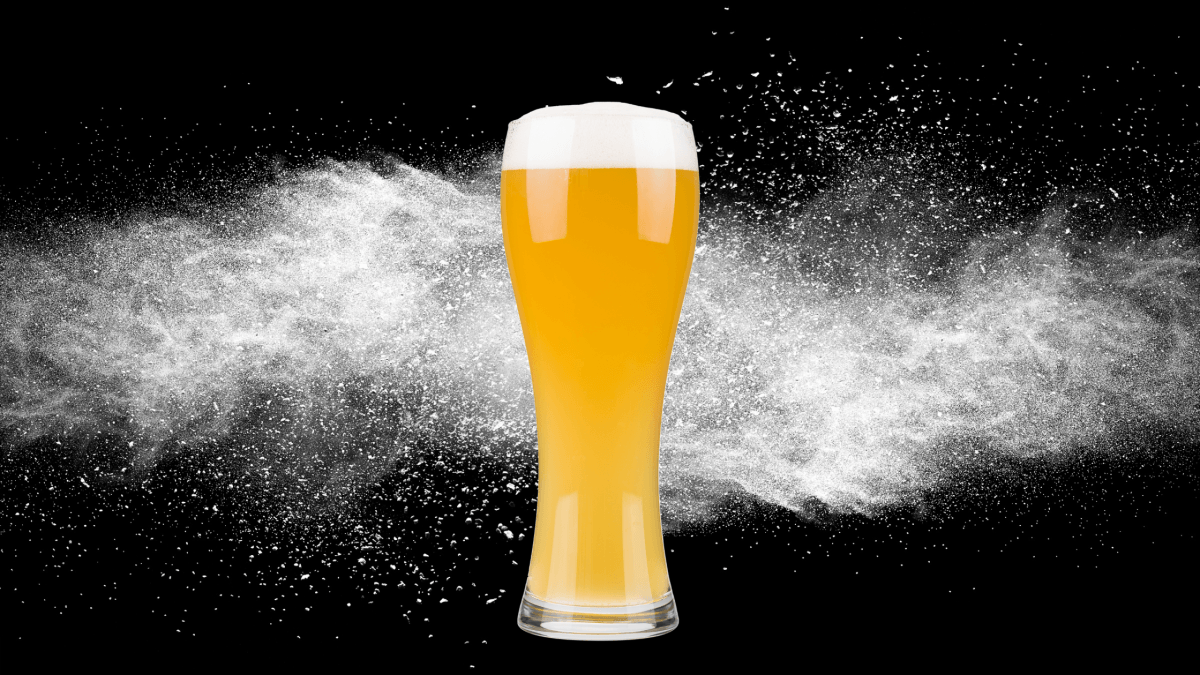Your cart is empty

Powdered Beer- A Valuable Breakthrough or Just Marketing?
In 2019, Kingfisher announced that it was releasing a new and innovative product: powdered beer. The promos for this new dehydrated beverage explained that drinkers would get two unique packets per serving. One sachet would create the “bubbles” while the other would add the always essential “beer flavour.”
Most importantly, the international Bangalore-based brewer promised this new form of malt beverage would still have the “same great taste” as the original Kingfisher beer.
Like most things in life, if it sounds too good to be true it probably is - the Kingfisher promotion turned out to be part of an April Fool’s campaign!
Several years later, it appears the future has arrived. A monastic brewery in Germany claims to have pioneered new techniques to produce beer in powdered form. They claim their methods will benefit both brewers and the planet.
So is this a viable solution to some of the problems with brewing? And what exactly is going on in Germany?
Innovations from Neuzeller Kloster-Bräu
Granulated beer isn’t the first time Neuzeller Kloster-Bräu has ruffled a few feathers in the beer world. Also known as the Neuzell Cloister Brewery, the producer has been brewing with adjuncts for decades - especially controversial in a country with such a proud and traditional brewing heritage as Germany!

The Nuezeller Klosterbrauerie has been producing forward-thinking beer for decades.
The brewery is best known for producing “Anti-aging Bier” packed with spirulina and other antioxidants. Despite adding algae, the beer isn’t green but dark brown.
In the early 2000s, the brewery was under legal fire due to violating German beer purity laws with a beer branded “Schwarzer Abt.” Due to the addition of sugar syrup, they were ordered to cease production or be fined for labelling the product as “bier.” (Imagine what the Germans would think of all the pastry stouts made here in the UK).
Instead of yielding to traditionalist thinking, the Klosterbrauerei eventually won a ten year legal battle. They were able to break through the narrow-minded scope of the Reinheitsgebot.
Development of Powdered Beer
After approximately 500 years in existence, Neuzelle made an exciting announcement: they had successfully produced beer powder. The beer is brewed as normal before going through a proprietary process that removes nearly all of the water from the final product.
Interestingly, the prototype is a non-alcoholic beer (also known as “breakfast beer” in Germany)—this had our ears perked up! Working together with technology partners, the brewery already has a range of alcoholic beers planned for production as “water-soluble beer powder/ granulate.”
Why would an old monastic brewery go to such lengths to develop a product more at home in the space race?
Besides the obvious monetary reasons, the company claims a more altruistic aim: to lower CO2 emissions in Germany and the rest of the world.
Brewing Isn’t So Green
Many brewers in the UK and Europe are like-minded with Sheep in Wolf’s Clothing when it comes to promoting sustainable brewing. However, even with the best intentions, making beer isn’t so planet-friendly.
If you’ve ever set foot in a production brewery, the first thing you may notice is the amount of water that goes into brewing. It’s estimated that seven litres of water goes into producing just one litre of beer!
Of course, the brewing process requires a whole lot of energy to create heat, drive pumps, and power glycol chilling banks. That doesn’t even count the electricity required to power lights and other necessities for breweries and their taprooms.
CO2 Emissions

A 2020 report found that Energy contributes 73.2% of global greenhouse emissions. Agriculture (18.4%), Industry (5.2%), and Waste (3.2%) make up the remaining piece of the greenhouse gas pie.
Unfortunately, beer is tied to every single slice of the global warming danger. When it’s all said and done, it’s estimated that one pint of beer results in between 300-900g of CO2 emissions. This means it’s up to brewers to find where they can make a difference (but they can’t be the only solution).
For example, brewers are using agricultural products like malt and hops, but have little to no say on what happens to them before they arrive at the brewery. Whereas, they can alter processes dealing with water waste, energy usage, and other daily activities.
It’s all about making small changes that add up to making a big difference.
Is Powered Beer a Solution to Sustainable Brewing?
Powered beer offers many possible benefits ranging from convenience to sustainability. Some of these include the following:
- Convenience for the drinker - e.g. taking powdered beer on a hike, to the beach or on an aeroplane.
- Simple storage solution - breweries, bars, pubs and other venues could save money by reducing commercial and industrial footprints.
- Less refrigeration - in granule form, less energy is required to keep beer fresh while being stored or chilled for dispensing in a bar.
- Lighter transport - powdered beer is 90-95% lighter in weight, requiring less energy and space for transport.
Of course, these benefits are purely theoretical without knowing more about the techniques involved. There are plenty of currently unanswered questions. The most important of which: how much energy goes into the dehydration process?
The Nuezelle Cloister Brewery claims its powdered beer will benefit the planet by disrupting the current logistics of beer transportation. According to the brewery’s General Manager Stefan Fritsche, “We have calculated that [from transportation alone], if we now relate this to Germany, we can save about 3 to 5 per cent of the CO2 emissions for Germany alone.”
One could imagine that we would be able to see a similar reduction here in the UK. Fritsche also believes that the distribution and transport of powdered beer would reduce global CO2 emissions by “about half a per cent.”
So how does the beer taste? At the moment, the jury is still out as not many have been able to try it. And while the brewery has plans for full-strength beer in dry form, they have not yet put any such product out.
Such a breakthrough for sustainable beer is exciting like most things, but it must be taken with a grain of salt (or beer). Regardless, It’s an exciting step forward!
Other Sustainable Innovations in Brewing
Powdered beer may be the current hot topic. However, plenty of effort to build more sustainable brewing is taking place all over the world.
Spent Grains as Biofuels
One of the culprits of waste material in brewing is the spent grain leftover from the mash. After much of the sugar has been converted and extracted, loads of protein and fibre are left behind in mounds of biomass.
A popular technique to reduce wastage is to pass off spent grains to farmers as cattle feed - of course, now we’re adding to the CO2 emissions produced by farming practices!
Researchers from Virginia and Polytechnic University have developed techniques to reuse brewery waste. Via enzymes and a newly discovered bacteria (Bacillus lichenformis), they have extracted protein for use in biofuels and other materials.
CO2 Capture
Traditionally, cask beer has always relied on refermentation to produce the lovely low-carbonation that we all enjoy. Many craft breweries here in the UK depend on industrial gas companies to supply CO2 for force-carbonating beer before packaging.
When yeast metabolises sugar it produces alcohol and carbon dioxide (among other things). Unfortunately, carbon dioxide is a primary greenhouse gas along with methane, nitrous oxide, ozone and water vapour.

Small-scale carbon capture will go a long way to reducing CO2 emissions for craft breweries.
A solution that saves money and reduces the emission of CO2 is a carbon dioxide capturing system. Until recently, this tech was way beyond the means of local and independent brewers. Thanks to Brexit red tape and European CO2 shortages, companies like Earthly Labs have been developing affordable capture systems.
These developments will go a long way towards eliminating an estimated 1 billion metric tons of annual CO2 emissions.
Beer Concentrate
In 2021, Colorado-based company Sustainable Beverage Technologies proposed an alternative solution to the transport costs of beer. The company’s BrewVo machine extracts alcohol and adds wort over several steps to produce a viscous beer concentrate.
This technique reduces beer to one-sixth of its original weight. Similar to many fountain soft drinks, they are rehydrated and carbonated during the serving process.
Powdered Beer is One Solution—There are Many More Problems to Solve!
At Sheep in Wolf’s Clothing Brewery, we are actively working together with our partners to ensure greener practices from production to distribution. The development of powdered beer is an exciting step on the sustainable brewing map.
While smaller transport and storage footprints will lower CO2 emissions significantly, we’ve still got a long way to go. Areas like water use and brewery waste materials are some of the areas that need a change. We should also be committing to 100 per cent renewable energy.
We can’t do this alone. The beer industry needs to take a good look at the real-world cost of “doing business.” It’s up to us to set the example and spread the message.
Watch this space to find out the next step for sustainable brewing at Sheep in Wolf’s Clothing.
- Choosing a selection results in a full page refresh.



1 comment
ohn
my name is ohn i tink non alcholic beer is wesome. But have u ever tryed acholic beer . beer=fun and im go and make my own business and run u out of business. ching ching bong dong ohn.